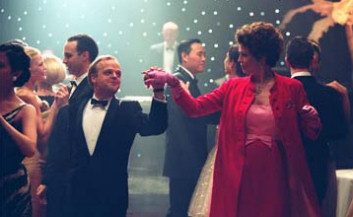On the Big Board |
| Position |
Staff |
In Brief |
| 56/200 |
Max Braden |
This was a little more fun than "Capote" |
Truman Capote was one of the more notorious writers of the 20th century. He was more than just an author for many reasons, drawing plenty of attention from all sorts of media, particularly television and magazines. Because of public feuds with such figures as Jackie Onassis, Norman Mailer and Gore Vidal, he kept himself constantly in the world's attention, but his quirks were possibly even more fascinating to his fans and detractor. He was an overt homosexual in a time when gay men rarely came out of the closet and he was a masterful wit.
Rather than waste any time attending college, Capote jumped right into writing. He published several short stories and finally completed a novel called Other Voices, Other Rooms in 1948. He continued writing books and scripts, both for the theater and for movies, and wrote possibly his most famous fiction novel, Breakfast at Tiffany's in 1958. He lived in Europe for ten years before returning to the United States in the late 1950s. His plan was to write what he called an "epic nonfiction novel."
The novel that came as a result of that desire occurred after he and childhood friend Harper Lee (writer of To Kill a Mockingbird) investigated the 1959 murders of a wealthy Kansas ranch family of four. Though initially the pair viewed the project as a simple "whodunit," the far-reaching results of their research had an enormous impact on Capote's life. He put five years of intense research into the book, and in the process developed and intense and complex relationship with the two murderers, Richard Eugene Hickock and Perry Smith. In particular, Smith became a source of fascination to the author, though in reading the book that Capote eventually wrote, he is certainly a most disturbing character.
That book, published in 1966, was In Cold Blood. It was both a critical and commercial success and is an intriguing read even nearly 40 years after its first appearance on shelves. Now, Capote's story is being turned to a big screen theatrical feature. Given the picture painted in his non-fiction examination of the events he investigated, it will be intriguing to see the situation presented from the other side. Capote did not insert himself as a character in his book, but George Plimpton eventually created an oral biography of the author that forms the basis of the film's plot. The title comes from the fact that Capote said of In Cold Blood, "Every word is true." (Kim Hollis/BOP)
|
|
|
|

![]() Tweet
Tweet



